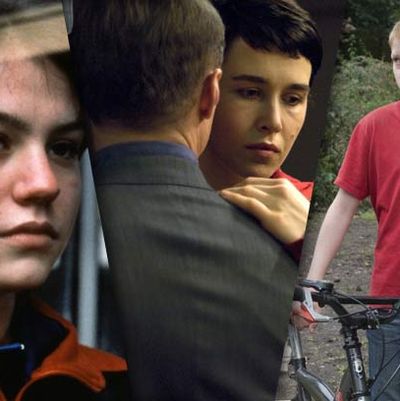
Little known in America outside cinephile circles, Luc and Jean-Pierre Dardenne are world-renowned Belgian directors whose latest masterwork is now in theaters. Two Days, One Night is a stirring account of a working-class woman’s (Marion Cotillard) efforts to convince her co-workers, over the course of a weekend, to give up their annual bonuses so that she might keep her job. Buoyed by a phenomenal Cotillard performance that’s already nabbed Best Actress prizes from numerous critics groups (New York, Boston, and San Diego, as well as the annual Village Voice and IndieWire critics polls), it’s a morality play that uses a simple premise to dig deeply into questions of fairness, altruism, and civic-versus-personal responsibility. As such, it’s in keeping with the rest of the Dardennes’ canon, which habitually focuses on citizens living on the margins of society, and which includes two winners (1999’s Rosetta and 2005’s L’Enfant) of the Cannes Film Festival’s prestigious Palm d’Or — a feat only they have achieved. Without a misstep to their name, the Dardennes are among the world’s greatest living filmmakers. Here is a guide to their key films:
Rosetta (1999)
After years producing (and making) documentaries, the Dardennes made their initial splash with their third fictional feature, 1996’s The Promise. It was 1999’s Rosetta, however, which would go on to win the highest honor from the Cannes Film Festival. Employing meticulous handheld cinematography and no soundtrack (both of which would become their stylistic hallmarks), the film tracks the arduous efforts of a teenage girl (Émilie Dequenne) to escape trailer-park hell and her drunken mother, and to give her life meaning — a quest that’s rooted in her desire to get a job, and one that’s repeatedly thwarted by unforeseen circumstances. A gloomy, gritty snapshot of a disadvantaged soul struggling to survive in a world that, at every turn, seeks to marginalize and crush her, it’s a story that maintains cool detachment from its subject, the better to honestly and unsparingly portray her literal and emotional plight — and in doing so, elicits an almost overpowering sense of heartbreaking empathy.
Le Fils (The Son) (2002)
Boasting a steady stream of handheld tracking shots from behind characters’ heads — a signature that’s subsequently been adopted by filmmakers the world over — 2002’s The Son brings an allegorical Christian subtext to its neorealist tale, about a carpenter (Dardenne regular Olivier Gourmet) who, at the school where he works, chooses to mentor a boy (Morgan Marinne) who years earlier killed his son. Why Gourmet’s mourning father chooses to do this — all while the boy remains ignorant of his connection to his new teacher — is left hauntingly opaque by the Dardennes, whose minimalist plot eschews expository explanations in favor of simply gazing, with fascination and bewilderment, at their subject as he becomes increasingly drawn to his new acolyte. A one-of-a-kind mystery that’s less interested in explicit answers than in attempting to understand the nature of grief and forgiveness, The Son has an intellectual inquisitiveness and clarity rivaled by few modern films.
L’Enfant (The Child) (2005)
The Dardennes’ second Palm d’Or came for 2005’s The Child, a melodrama about a young couple (Jérémie Renier and Déborah François) whose day-to-day small-town lives scrounging around for subsistence are irrevocably upended when the girl discovers she’s pregnant. In a desperate decision, the boy decides to sell their baby on the black market behind his girlfriend’s back, only to then regret the decision and attempt to reclaim it. Fixated on one young man’s moral and spiritual crisis, the film is bolstered by the Dardennes’ judgment-free depiction of their protagonist’s increasingly disastrous decisions and the lengths he must go to find some measure of salvation. The Child generates an amazing amount of tension and pathos from its straightforward plot’s intertwined issues of guilt, shame, and regret, all of which come to a head during a fantastic late chase sequence and a finale that’s perhaps the most poignant scene in the directors’ oeuvre.
Lorna’s Silence (2008)
The Dardennes faced some initial criticism for mixing up their formula and utilizing a genre-y plot, delicate musical score, and urban setting for 2008’s Lorna’s Silence — objections that ignored the fact that, in most every respect, the film is another of their exceptional efforts about a down-on-her-luck protagonist squeezed by myriad socioeconomic forces. The tale of an Albanian woman (Arta Dobroshi) trapped in a miserable marriage of convenience to a drug addict (Jérémie Renier) and beholden to a Russian gangster (Fabrizio Rongione), the story begins as a gritty study of its protagonist’s miserable daily grind, only to grow into a complex quasi-thriller once Dobroshi’s Lorna develops unexpected feelings for her spouse and those, in turn, threaten her chances to transcend her situation. As incisive as their prior efforts, and yet more suspenseful as well, Lorna’s Silence proved that the Dardennes could expand their horizons without losing sight of what they do best.
The Kid With a Bike (2011)
With a title (and premise) intended to recall Italian director Vittorio De Sica’s 1948 neorealist classic Bicycle Thieves, the Dardennes’ The Kid With a Bike charts the lonely ordeal of a young 11-year-old (Thomas Doret) who’s abandoned by his father (Jérémie Renier) and, upon reuniting with him, learns firsthand that he’s unwanted. Through an unforeseen encounter, the boy gets a second chance at happiness through his relationship with an angelic local hairdresser (Cécile de France) — a bond that casts the material as the most fairy-tale-ish of all the directors’ works. Nonetheless, courtesy of a superb lead performance by Doret, the Dardennes tap into a potent strain of raw, urgent adolescent anger and misery. Marked by endless scenes in which their main character seems to be in a perpetual state of motion, often in order to reclaim his oft-stolen bike, The Kid With a Bike is a wrenching portrait of youthful suffering, and — like all of their films — of the arduous path sometimes required to achieve safety, salvation, and love.

